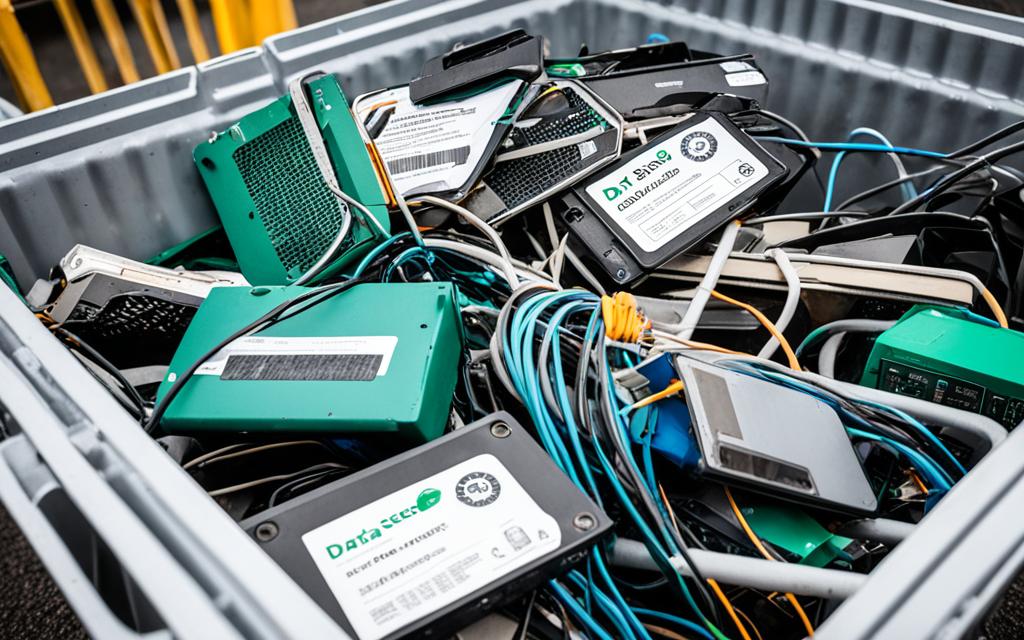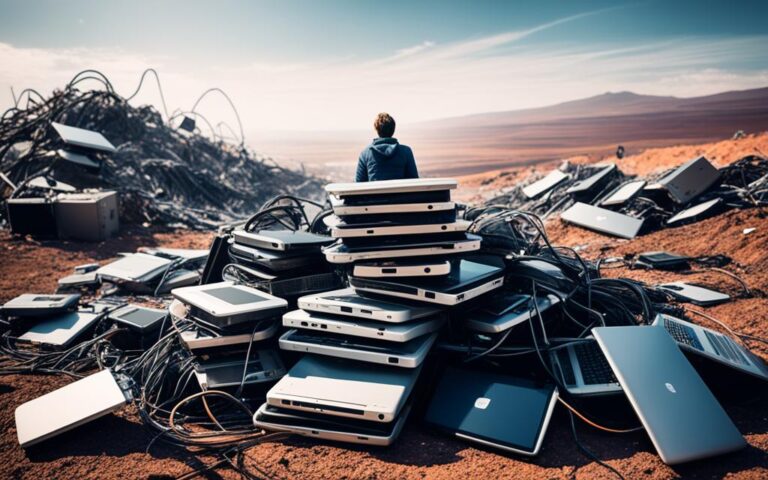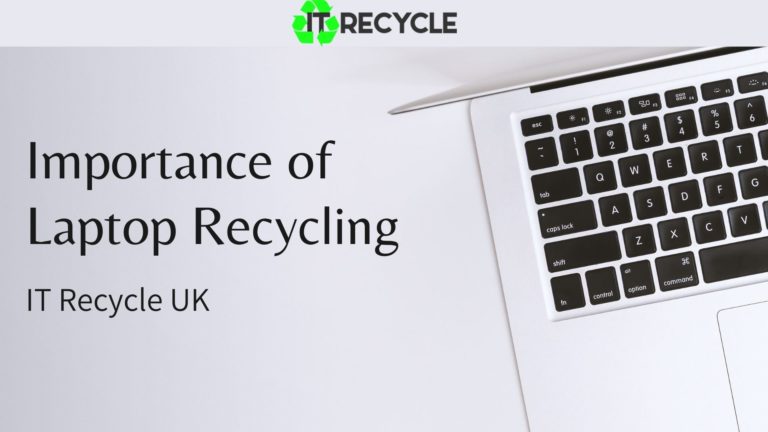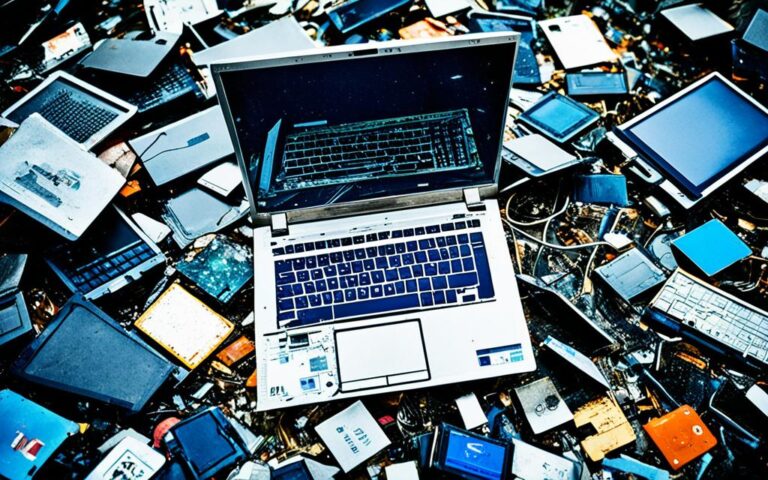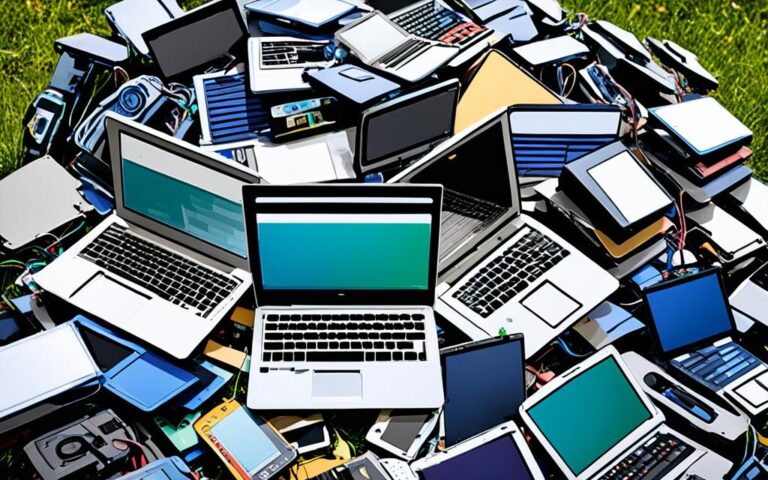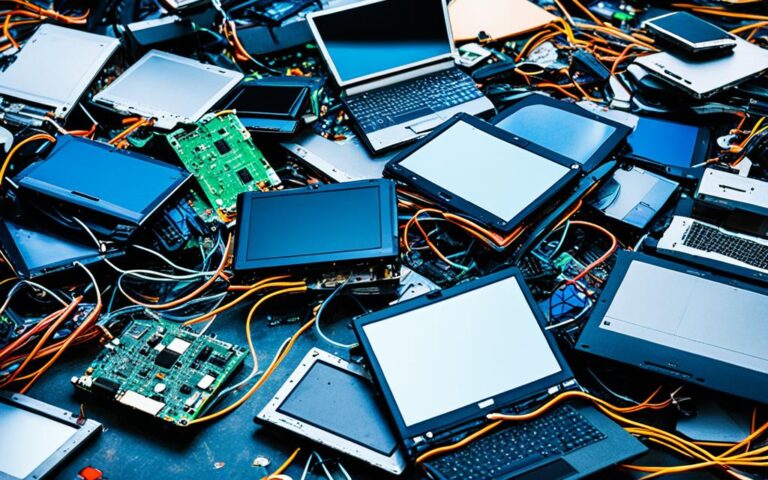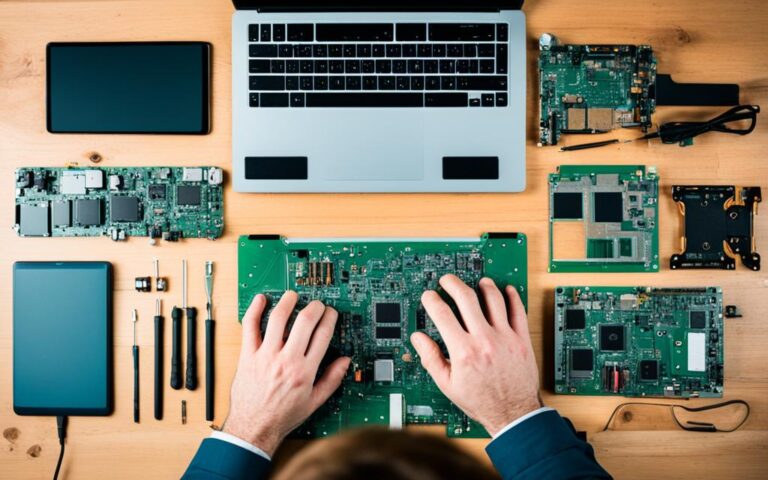How to Recycle Laptops While Complying with Data Privacy Laws
In today’s digital landscape, the proper disposal of old laptops is not just about being environmentally conscious; it also involves protecting sensitive data and complying with data privacy laws. Merely deleting files is no longer enough to ensure the security of your information. The risk of unauthorized access, data breaches, and potential legal implications necessitates a more comprehensive approach.
Recycling laptops while safeguarding data requires knowledge of the types of information that need protection, methods to prevent data loss, and responsible disposal practices. By understanding the importance of data privacy and taking the necessary precautions, individuals and businesses can navigate the recycling process confidently.
Within this article, we will guide you through the steps to recycle laptops while complying with data privacy laws. From the importance of data privacy to protecting sensitive information during disposal, we will provide you with valuable insights and recommendations. Let’s dive into the world of laptop recycling, data privacy, and secure disposal.
Why is Data Privacy Important when Recycling Laptops?
Data privacy is a critical consideration when it comes to the disposal of old laptops. It serves as a protective measure against unauthorized access to sensitive information and plays a significant role in reducing various risks, including fraud, identity theft, financial loss, litigations, legal penalties, blackmail, and extortion.
“Data privacy helps prevent unauthorised access to sensitive information, reducing the risk of fraud, identity theft, financial loss, litigations, legal penalties, blackmail, and extortion.”
When recycling laptops, failing to prioritize data privacy can have severe consequences. Without proper measures in place, personal or business information can fall into the wrong hands, leading to devastating outcomes.
For individuals, the loss of personal data can result in identity theft or financial loss. Criminals can misuse personal information for their nefarious purposes, potentially ruining lives and causing significant harm.
Businesses, too, are at risk when data privacy is not ensured during laptop disposal. Confidential business files may contain trade secrets, customer information, or proprietary data that, if accessed by unauthorized individuals, can lead to legal and financial repercussions.
By overlooking data privacy during the disposal of old laptops, individuals and businesses open themselves up to potential litigations, legal penalties, and damaged reputations.
Therefore, it is essential to prioritize the safeguarding of information and comply with data privacy regulations when recycling laptops. Taking proactive steps to ensure data privacy not only protects individuals and businesses alike but also contributes to a safer and more secure digital environment.
In the next section, we will delve into the specific types of data that require protection during laptop recycling and explore the measures necessary to safeguard this information effectively.
Types of Data That Need Protection
When it comes to laptop recycling, it’s important to understand the types of data that require protection. Whether you’re a business owner or an individual, certain information should be safeguarded to ensure data privacy.
Here are the key types of data that need protection:
- Personally Identifiable Information (PII): This includes any data that can be used to identify an individual, such as their name, address, social security number, or email address.
- Protected Health Information (PHI): PHI is sensitive information related to an individual’s medical history, treatment, or payment for healthcare services. Examples include medical records, prescriptions, or health insurance details.
- Confidential Business Files: Businesses need to protect confidential information such as financial records, customer databases, intellectual property, or trade secrets. This can involve client lists, financial statements, sales data, or business strategies.
- Payment Details: Credit card numbers, bank account information, and other payment details need to be safeguarded to prevent unauthorized access and potential financial fraud.
In addition to the above, personal devices may also contain:
- Family Pictures: Photos of loved ones and precious memories are personal and should be handled with care.
- Location Information: Devices often store location data, which can reveal details about an individual’s movements and habits.
- Academic or Professional Files: Personal laptops might contain valuable academic work, professional projects, or research data that should be protected from unauthorized access or loss.
By understanding the importance of data protection for these different types of information, you can take the necessary steps to securely recycle your laptop without putting sensitive data at risk.
Preventing Data Loss During Laptop Recycling
When it comes to recycling your laptop, preventing data loss should be a top priority. Simply disposing of your old laptop without taking the necessary precautions can leave your sensitive information vulnerable to unauthorized access. To safeguard your data, there are several key steps you can take:
Transfer Data to an External Device
One effective method to prevent data loss is by transferring valuable files and documents to an external storage device. By doing so, you can ensure that your important data remains safe and accessible even after recycling your laptop. Whether it’s a USB drive, an external hard drive, or a secure storage device, transferring your data provides an additional layer of protection.
Back Up Data to the Cloud
Another option for preventing data loss is backing up your files and documents to the cloud. Cloud storage services offer a convenient and secure way to store your data remotely. By uploading your files to the cloud, you can access them from any device and have peace of mind knowing that your information is protected. Popular cloud storage options include Google Drive, Dropbox, and Microsoft OneDrive.
Remove the Hard Disk
If you’re concerned about the security of your data, removing the hard disk from your laptop is a surefire way to prevent any potential data breaches. By physically removing the hard disk, you can retain full control over your personal information. It’s important to note that removing the hard disk requires technical expertise, so if you’re not familiar with the process, it’s advisable to seek professional assistance.
Considerations and Advantages
Each method discussed above has its own considerations and advantages. Transferring data to an external device provides direct control and offline access to your files, while cloud storage offers convenient accessibility from anywhere with an internet connection. Removing the hard disk ensures complete physical control over your data but requires technical knowledge and expertise. It’s important to weigh these factors and choose the method that best suits your needs and level of comfort when it comes to data privacy and security.
By taking proactive steps to prevent data loss during laptop recycling, you can protect your personal and confidential information from unauthorized access and potential data breaches. Safeguarding your data is an essential part of responsible laptop disposal, and these preventive measures can help ensure the security and privacy of your valuable information.
Protecting Information During Laptop Disposal
Once you have taken the necessary steps to safeguard your data, the next crucial step is to protect the information during the disposal of old laptops. There are several methods you can employ to ensure that your data remains secure and irretrievable.
Overwriting Data with Software
One effective way to protect your information is to overwrite the data on your laptop’s hard drive using software. This process involves replacing the existing data with random characters, making it virtually impossible for anyone to recover the original information. There are several software programs available that can securely overwrite your data and make it irrecoverable.
Physically Destroying the Hard Disk
Another option for protecting your data is to physically destroy the hard disk of your old laptop. By physically damaging the hard disk, you eliminate any possibility of data retrieval. This method ensures that your information is completely destroyed and cannot be accessed by unauthorized individuals.
Degaussing Data from Magnetic Storage Tapes
If you are disposing of old laptops that use magnetic storage tapes, degaussing is a viable method for data destruction. Degaussing involves erasing the data by exposing the magnetic media to a strong magnetic field. This process effectively removes all traces of data from the tapes, ensuring that the information is rendered unrecoverable.
Utilizing Data Destruction Services
For the utmost assurance that your data is securely destroyed, consider utilizing the services of certified laptop recyclers that offer data destruction services. These professionals possess the expertise and equipment to ensure that your information is completely wiped and erased from your old laptops. By entrusting your data destruction to these reputable services, you can have peace of mind knowing that your information is in safe hands.
By employing one or more of these methods, you can effectively protect your information during laptop disposal. Whether you choose to overwrite the data with software, physically destroy the hard disk, degauss the data from magnetic tapes, or utilize data destruction services, you can rest assured that your sensitive information will remain confidential and secure.
Where to Dispose of Old Laptops
When it comes to getting rid of your old laptops, disposing of them in landfills or trash cans is not only harmful to the environment but also poses security risks. Proper waste management and recycling of electronic waste are essential to protect our planet and safeguard sensitive information. To ensure secure disposal and data privacy compliance, it is recommended to contact a certified laptop recycling service. These services offer data destruction, shredding, and safe disposal of old laptops, prioritizing both environmental sustainability and security.
“Proper disposal of electronic waste is crucial for maintaining a sustainable future while protecting against data breaches.”
By choosing a reputable laptop recycling service, you can contribute to proper waste management and minimize the impact of electronic waste on our environment. Not only will they securely dispose of your old laptops, but they will also ensure that valuable components and materials are recycled responsibly.
When searching for a laptop recycling service, it’s essential to look for certifications and accreditations that guarantee their commitment to ethical recycling practices and data privacy compliance. Reputable services often hold certifications such as ISO 14001 for environmental management and ISO 27001 for information security management.
Here’s a comprehensive table comparing different laptop recycling services to help you make an informed decision:
| Service | Offerings | Certifications | Locations |
|---|---|---|---|
| GreenTech Recycling | Data destruction, secure disposal, environmentally friendly recycling | ISO 14001, ISO 27001 | London, Manchester, Birmingham |
| E-Waste Experts | Secure data erasure, asset recovery, component recycling | ADISA, ISO 14001, ISO 27001 | Leeds, Glasgow, Bristol |
| RecycleIT | Data wiping, physical destruction, responsible recycling | ADISA, ISO 9001, ISO 14001 | Edinburgh, Cardiff, Belfast |
Comparison table: Laptop recycling services offering secure disposal and responsible recycling.
It’s important to remember that not all laptop recycling services are created equal. Choosing a certified service ensures that your old laptops will be handled and disposed of properly, thereby contributing to a more sustainable future while complying with data privacy regulations.
Proper waste management and secure disposal go hand in hand when it comes to protecting our environment and data privacy. Take the responsible approach and dispose of your old laptops through a certified laptop recycling service to ensure a greener future for generations to come.
Backing up Data and Deleting Files
Before recycling your laptop, it is important to back up any necessary data and securely delete files. Simply deleting files does not permanently remove the data, leaving it vulnerable to unauthorized access. This section will discuss the importance of backing up data, methods for securely deleting files, and software options for wiping hard drives.
When recycling a laptop, it is essential to back up data that you wish to keep. This ensures that valuable files, documents, and media are preserved, preventing any potential data loss. Backing up your data can be done in various ways:
- Using an external hard drive or storage device
- Uploading files to a cloud storage service
- Transferring data to another device on your network
By creating a secure backup of your data, you can confidently proceed with the recycling process, knowing that your important files are safe and accessible for future use.
Once you have backed up your data, it is crucial to delete files securely from your laptop. Simply deleting files and emptying the recycle bin is not enough to permanently erase them. Deleted files can still be recovered using specialized software or forensic techniques.
Here are some methods for securely deleting files:
- Using file shredder software that overwrites the data multiple times, making it virtually impossible to recover
- Formatting the hard drive to remove all existing data
- Physically destroying the hard drive by disassembling the laptop or using a certified shredding service
By securely deleting files, you ensure that sensitive information cannot be retrieved after recycling your laptop.
Software options for wiping hard drives are also available, providing an additional layer of security when disposing of your laptop. These programs overwrite the entire hard drive with random data, effectively erasing all existing information. Some popular software options for wiping hard drives include:
1. DBAN (Darik’s Boot and Nuke) – A powerful open-source tool for securely erasing hard drives.
2. CCleaner – A comprehensive system optimization and privacy tool that includes drive wiping functionality.
3. Eraser – A reliable software that can securely erase data from hard drives, USB drives, and other storage devices.
By utilizing these software options, you can ensure that your data is securely wiped from the hard drive, leaving no trace of sensitive information.
In summary, before recycling your laptop, it is crucial to back up any necessary data and securely delete files. Simply deleting files is not enough to permanently remove the data. By following proper backup and secure deletion methods, such as using external storage devices, cloud services, file shredders, or wiping software, you can safeguard your information and ensure a secure recycling process.
Conclusion
In conclusion, ensuring data privacy while recycling laptops is essential for both individuals and businesses. By taking the necessary steps to protect and securely dispose of data, you can prevent unauthorized access and potential data breaches. Proper disposal methods, such as physically destroying hard drives or utilizing certified recycling services, offer peace of mind and compliance with data privacy laws.
When it comes to laptop recycling, it is important to prioritize data privacy by choosing a reputable recycling service that prioritizes secure disposal. Eco Green IT Recycling is a trusted name in the industry, offering professional assistance with laptop recycling and data destruction. They employ secure and environmentally-friendly practices to ensure the protection of your data and the proper disposal of your old laptops.
Remember, simply deleting files or formatting the laptop’s storage does not guarantee the complete removal of sensitive data. To effectively safeguard your information, consider utilizing data destruction services that follow strict protocols to prevent any data recovery. By doing so, you can protect your privacy and contribute to sustainable waste management by recycling your old laptops responsibly.
FAQ
How can I ensure data privacy when recycling laptops?
To ensure data privacy when recycling laptops, it is crucial to take certain steps. These include transferring valuable data to an external device, backing up data to the cloud, or removing the hard disk from the laptop. Each method has its advantages and considerations which should be taken into account.
What types of data need protection during laptop recycling?
Several types of data require protection during laptop recycling. This includes personally identifiable information, protected health information, business files containing confidential information, payment details, as well as personal files such as family pictures, location information, and academic or professional files.
How can I protect information during the disposal of old laptops?
To protect information during the disposal of old laptops, there are several methods you can employ. These include overwriting data with software to make it irrecoverable, physically destroying the hard disk to prevent retrieval, degaussing data from magnetic storage tapes, or utilizing data destruction services offered by certified laptop recyclers.
Why is it important to properly dispose of old laptops?
Improper disposal of old laptops can have environmental and security consequences. Dumping laptops in landfills or trash cans not only contributes to electronic waste but also puts sensitive information at risk. It is recommended to contact a certified laptop recycling service that offers data destruction, shredding, and safe disposal of old laptops.
How should I back up data and securely delete files before recycling my laptop?
Before recycling your laptop, it is important to back up any necessary data and securely delete files. Simply deleting files does not permanently remove the data. You can back up data by transferring it to an external device or by backing it up to the cloud. To securely delete files, you can use software options for wiping hard drives that overwrite the data.
Where should I dispose of my old laptops?
When disposing of old laptops, it is recommended to contact a certified laptop recycling service. These services offer data destruction, shredding, and safe disposal of old laptops. Proper waste management and recycling of electronic waste are important for both environmental and security reasons.
Why is data privacy important when recycling laptops?
Data privacy is important when recycling laptops as it prevents unauthorized access to sensitive information. Failure to safeguard data during the disposal of old laptops can lead to consequences such as fraud, identity theft, financial loss, litigations, legal penalties, blackmail, and extortion.
How can I comply with data privacy laws when recycling laptops?
To comply with data privacy laws when recycling laptops, it is essential to take steps to protect and securely dispose of data. This includes ensuring data privacy during the disposal process, using methods such as physically destroying hard drives or utilizing certified recycling services that offer data destruction and safe disposal.

